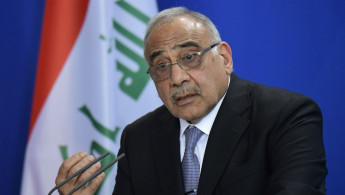Iraq PM says US strike threatens 'devastating war'
"The assassination of an Iraqi military commander in an official post is an aggression against the country of Iraq, its state, its government and its people," Abdul Mahdi said in a statement on Friday.
Qais al-Khazali, commander of one of the Hashd al-Shaabi constitutent militias, earlier suggested the strike could spell an end to the US military presence in Iraq.
"The price for the blood for the martyred commander Abu Mahdi al-Muhandis is the complete end to American military presence in Iraq," said Khazali, chief of the Asaib Ahl al-Haq (League of the Righteous) militia, urging his fighters to be on "high alert" for battle.
Hashd al-Shaabi, or the Popular Mobilisation Forces, is a network of mostly Shia armed factions, many of whom have close ties to Tehran.
The combined forces have been officially incorporated into Iraq's state security apparatus and were a key actor in the country's fight against the Islamic State extremist group.
|
|
However, Hashd al-Shaabi and its constitutent militias have been accused of war crimes motivated by sectarianism, including the targeting abduction and killing of Sunni Muslim civilians.
Seen as Iran's main arm of control in Iraq, where Tehran exhibits extensive control over politics and security, the Iran-backed militias have also been accused of leading the crackdown on the mass protest movement that erupted in early October.
The killing of both Soleimani and Muhandis threatens further turmoil for an Iraq already beset by political crisis.
The pair will be buried on Saturday, when Iraq's parliament is expected to meet for an emergency meeting to discuss the strike.
Soleimani's killing has sparked fears of war not only from Iraq's outgoing prime minister but also from people around the world. "World War 3" became a global trend on Twitter on Saturday, with Google searches for the phrase also spiking.
In Iran, Supreme Leader Ayatollah Ali Khamenei announced three days of national mourning, while also pledging "severe revenge" against the US.
In Lebanon, the Iran-backed Hezbollah militant group promised to continue in Soleimani's path.
Avenging his death, leader Hassan Nasrallah said in a statement, will be the "task of all resistance fighters worldwide".
In Iraq's Tahrir Square, however, there were celebrations as protesters heard of the killing of Iran's pointman in Baghdad.
In the epicentre of the protest movement that has condemned the Iraqi government as corrupt and beholden to Tehran, demonstrators chanted: "Oh Qasem Soleimani, this is a divine victory."
The strike on Baghdad came amid rising tensions with Washington after a New Year's Eve attack by Hashd al-Shaabi supporters on the US Embassy in Baghdad, prompting Trump to order about 750 US soldiers deployed to the Middle East.
The two-day embassy siege, which ended Wednesday, was triggered by US airstrikes on Sunday that killed 25 fighters from Kataib Hezbollah, another Iran-backed Iraqi militia and key component of Hashd al-Shaabi. The deadly strikes came in retaliation against the killing of an American contractor in a rocket attack on an Iraqi military base last week.




 Follow the Middle East's top stories in English at The New Arab on Google News
Follow the Middle East's top stories in English at The New Arab on Google News


